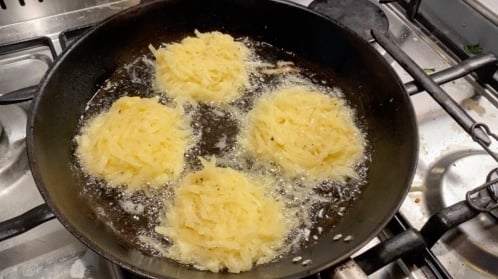Eat This Newsletter: Rose-scented
 Hello
Hello
As the podcast goes briefly dormant for its summer rest, I plan to publish the newsletter every week. That may mean some issues are slimmer than others, so I would appreciate any items you may care to share with me. Replying to this newsletter is an easy way to do so. Thanks.
A taste of history
At my grammar school it was obvious that nobody could possibly want to study geography and history; on the basis of the teachers’ personalities, I gave up history for geography, a decision I have been making amends for ever since. I’m quite certain, though, that neither Mr Jackson nor Mr Davies would ever have taught a lesson like Alyssa Goldstein Sepinwall, who writes about Potato Latkes and Pedagogy.
Goldstein Sepinwall uses recipes to enliven her course on Women and Jewish History and prod students into experiencing some of the realities of migration, assimilation, acculturation and all the rest of it, and by her account, students enjoy and remember the course. She makes it personal with her own family’s latke recipe, which owed its origins not to a long-lost bubba in the shtetl but to a recipe in the booklet that accompanied her mom’s Osterizer in 1963. Acceptance!

It does sound like an interesting approach to teaching, but honestly, puréed potatoes in a latke? Not in my kitchen.
Complementary not Complimentary
Two pieces that go quite well together. First, Tortoise Media (a “slow newsroom making sense of a fast moving world”) released its Better Food Index for 2023. The most interesting finding to me was that for 11 of the 30 largest food and drink companies in the UK, their ultra processed offerings offer more calories per pound (sterling) than their less processed foods.
At five companies – Fletcher Bay Group, Dunbia, Hilton Food Group, Cranswick and Kraft Heinz – the number of calories per £ is more than twice as high in UPFs than in non-UPFs.
The lead researcher on the index explores this particular aspect of the findings in greater detail, concluding:
[T]he worst outcome of the price squeeze would be cheaper ultra-processed food while the cost of healthy staples goes on up. But with so much to lose and little immediate gain, the producers aren’t going to move first. This is about policy, and politicians need to lead.
Of course, the whole analysis is destined to bring forth all the old arguments about how not all foods classified as ultra-processed are unhealthy, and vice versa. The British Nutrition Foundation got a jump on Tortoise by issuing its Position statement on the concept of ultra-processed foods (UPF) in April. Fortunately, Marion Nestle was on hand to take a closer look and, as she notes, “When I read things like this, I have the usual question: Who paid for this?” She answers that, and offers more.
A roundtable organised by the BNF agreed that “many foods classified as UPF are high in fat, sugars and/or salt and public health messages should continue to focus on reducing these in the diet”. But the roundtable also expressed “concern … about potential unintended consequences, particularly for vulnerable groups”. Nestle pounces on that:
It’s OK for rich people to avoid UPF but OK for poor people to eat them? I think the food industry is in trouble on this one. It has gotten away with pushing junk food for way too long. The British Nutrition Foundation would be much more credible if it put public health first.
Quick bites
I will probably never eat at Alexandra Holt’s restaurant Roxanne in Philadelphia, but I definitely enjoyed reading about it, and her.
I don’t need to read all about the bankruptcy of Indoor Vertical Farmer AeroFarms (because it is behind a paywall) to wonder, again, about the business proposition that underpins all such endeavours.
And more I-told-you-so. Local is essentially meaningless, but what’s the alternative? Actually think about the food system?
Coming up roses
I slightly short changed Saghar Setareh last week by being a bit too busy to publish the transcript of our fascinating conversation at the same time as the episode itself. No matter, it gives me another opportunity to point you to the episode. Better yet, it also gives me the chance to mention a rosewater festival to be held in the village of Soltanabad in Iran, which is about 225 km west of Tehran. Details are somewhat sketchy, but based on the article, I hope it is a roaring success.
Take care.

p.s. Photo by Saeid Toluei from a set of harvesting roses in Bojnoord, a long way from Soltanabad.
Add a comment: